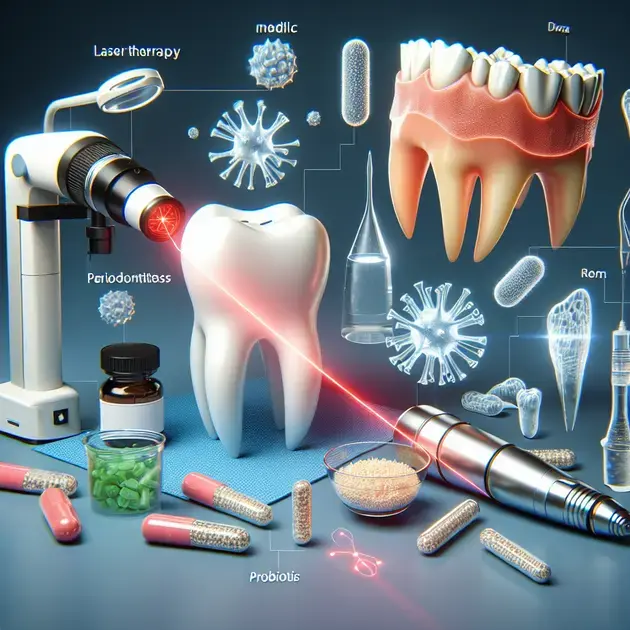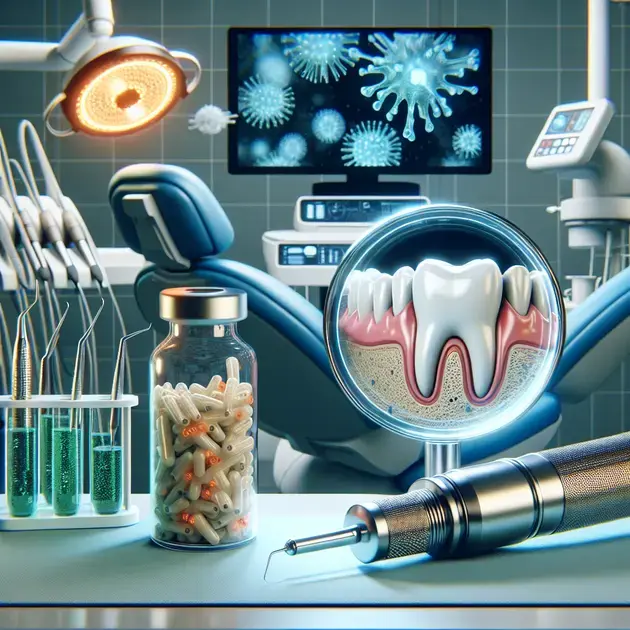Looking for effective medication to treat periodontitis? You’ve come to the right place. In this comprehensive guide, we will explore the various treatment options available to combat this common oral health issue.
Periodontitis, a severe form of gum disease, affects millions of people worldwide. It can lead to tooth loss and other serious health complications if left untreated. Fortunately, with the right medication and proper dental care, it is possible to manage and even reverse the effects of periodontitis.

Understanding Periodontitis Treatment Options
Periodontitis is a serious gum infection that damages the soft tissue and destroys the bone that supports your teeth. It can lead to tooth loss if not treated properly. Understanding the treatment options available for periodontitis is essential for managing the condition effectively. Here are some common treatment options:
1. Scaling and Root Planing
One of the primary treatments for periodontitis is scaling and root planing. This deep cleaning procedure removes plaque and tartar from the teeth and roots, helping to control the infection and promote healing. You can find more information about this treatment on the American Dental Association website.
2. Antibiotics
In some cases, your dentist may prescribe antibiotics to help control bacterial infection in the gums. These medications can be taken orally or applied directly to the affected area. Consult with your dentist or healthcare provider to learn more about antibiotic treatment for periodontitis.
3. Surgery
In advanced cases of periodontitis, surgical intervention may be necessary to restore gum and bone health. Procedures such as flap surgery, bone grafts, and tissue regeneration can help repair the damage caused by the infection. To explore surgical treatment options, visit the Mayo Clinic website.
4. Ongoing Maintenance
Once you have undergone treatment for periodontitis, it’s important to maintain good oral hygiene habits to prevent a recurrence of the condition. This includes regular brushing, flossing, and dental check-ups. Consider using the Oral-B app to track your oral care routine and receive personalized recommendations for managing periodontitis.
5. Laser Therapy
Laser therapy is a minimally invasive treatment option for periodontitis that can help reduce inflammation and promote healing. This advanced technique targets bacteria and infected tissue while preserving healthy gums. Talk to your dentist about the possibility of laser therapy as part of your periodontitis treatment plan.
Exploring Medication for Periodontitis
Medication can play a crucial role in managing periodontitis and controlling the progression of the disease. Exploring different types of medication options with your healthcare provider can help you find the most effective treatment plan. Here are some common medications used for periodontitis:
1. Antibacterial Mouthwash
Antibacterial mouthwashes containing chlorhexidine or other active ingredients can help reduce bacteria in the mouth and prevent gum infections. Consider using Listerine Antiseptic Mouthwash as a part of your daily oral hygiene routine to combat periodontitis.
2. Antiseptic Gels
Topical antiseptic gels can be applied directly to the gums to target bacteria and reduce inflammation. Products like Orajel Antiseptic Rinse provide targeted relief for gum infections and can be a valuable addition to your periodontal care routine.
3. Oral Antibiotics
Oral antibiotics are sometimes prescribed to control bacterial growth in the gums and promote healing. Common antibiotics used for periodontitis include doxycycline and metronidazole. Consult with your dentist or periodontist to determine if oral antibiotics are suitable for your treatment plan.
4. Pain Relief Medications
If you experience discomfort or pain due to periodontitis, over-the-counter pain relief medications like ibuprofen or acetaminophen can help alleviate symptoms. Follow the recommended dosage instructions and consult with a healthcare professional if you have concerns about pain management.
5. Anti-Inflammatory Drugs
Nonsteroidal anti-inflammatory drugs (NSAIDs) can help reduce inflammation in the gums and alleviate pain associated with periodontitis. Products like Advil or Aleve can be effective in managing discomfort caused by gum infections. Remember to discuss medication options with your healthcare provider before starting any new treatment.
Effective Strategies for Managing Periodontitis
Managing periodontitis requires a comprehensive approach that combines professional treatment with diligent home care practices. By implementing effective strategies for managing the condition, you can improve gum health and prevent further damage to your teeth and supporting structures. Here are some key strategies to consider:
1. Consistent Oral Hygiene
Consistent oral hygiene practices, such as brushing twice a day and flossing daily, are essential for managing periodontitis. Use a soft-bristled toothbrush and antimicrobial toothpaste to clean your teeth and gums thoroughly. Consider using the Colgate Connect app to track your oral hygiene routine and receive personalized tips for optimal gum health.
2. Healthy Diet
A balanced diet rich in nutrients can support overall oral health and help prevent gum disease. Include foods high in vitamin C, such as citrus fruits and leafy greens, to promote gum tissue healing. Limit sugary snacks and beverages that can contribute to bacterial growth and inflammation in the mouth.
3. Stress Management
Stress can weaken the immune system and contribute to inflammation in the body, including the gums. Practice stress-reducing techniques such as meditation, yoga, or deep breathing exercises to manage stress levels and support gum health. Explore mindfulness meditation apps like Headspace or Calm for guided relaxation and stress relief.
4. Regular Dental Visits
Scheduling regular dental check-ups and cleanings is crucial for monitoring the progress of your periodontal treatment and addressing any new or recurring issues promptly. Your dentist can evaluate your oral health status, provide professional cleanings, and offer personalized recommendations for maintaining healthy gums.
5. Smoking Cessation
Smoking is a significant risk factor for periodontitis and can impede the effectiveness of treatment efforts. If you smoke, consider quitting to improve your gum health and overall well-being. Explore smoking cessation resources such as the QuitGuide app or consult with your healthcare provider for support in quitting tobacco use.

Understanding Medication for Periodontitis and its Impact
Periodontitis is a serious gum infection that damages the soft tissue and destroys the bone that supports your teeth. Understanding the medication options available for treating periodontitis is crucial for managing the condition effectively. In severe cases, a dentist may prescribe antibiotics to help control the infection and prevent it from spreading further. These medications can come in various forms, such as pills, mouth rinses, or gels, and they work by killing the bacteria causing the infection.
One of the key medications used for periodontitis is tetracycline, which is effective in fighting the bacteria associated with gum disease. This antibiotic works by inhibiting the growth of bacteria and reducing inflammation in the gums. Another common medication is chlorhexidine, a prescription mouthwash that can help reduce plaque and prevent gum disease progression when used regularly.
It’s important to follow your dentist’s instructions when taking medication for periodontitis to ensure optimal results. Proper use of antibiotics and other prescribed medications can help control the infection, reduce inflammation, and promote gum healing. However, it’s essential to be aware of any potential side effects and discuss any concerns with your healthcare provider.
In conclusion, understanding the medication options for periodontitis and their impact on treating the condition is essential for maintaining good oral health. By following your dentist’s recommendations and taking prescribed medications as directed, you can effectively manage periodontitis and prevent further complications.
Exploring New Avenues in Periodontitis Medication
Recent advancements in periodontitis medication have opened up new avenues for treating this common dental condition. Researchers are constantly exploring innovative therapies and treatment options to improve the management of periodontitis and enhance patient outcomes. One promising development is the use of probiotics, which are beneficial bacteria that can help restore the balance of the oral microbiome and reduce inflammation in the gums.
Another exciting avenue in periodontitis medication is the use of targeted drug delivery systems, such as microspheres or gels, that can deliver medication directly to the site of infection. This approach can increase the effectiveness of treatment while minimizing side effects. Additionally, emerging technologies like photodynamic therapy are showing promise in killing bacteria and reducing inflammation in the gums.
Combining traditional treatment methods with these new avenues in periodontitis medication can lead to more personalized and effective care for patients. By staying informed about the latest advancements in dental research and working closely with your healthcare provider, you can explore innovative treatment options to better manage periodontitis and improve your oral health.
In conclusion, exploring new avenues in periodontitis medication offers hope for more targeted and efficient treatment options. By embracing these innovative approaches and incorporating them into standard care practices, patients can experience improved outcomes and better long-term oral health.
Implementing Effective Strategies for Improved Periodontitis Management
Managing periodontitis effectively requires a comprehensive approach that includes implementing proven strategies to control the infection and maintain oral health. One essential strategy is practicing good oral hygiene, including daily brushing and flossing, to remove plaque and bacteria that can contribute to gum disease. Regular dental check-ups and cleanings are also crucial for monitoring the condition and addressing any issues promptly.
Diet plays a significant role in periodontitis management, with a focus on consuming a balanced diet rich in vitamins and minerals that support gum health. Avoiding sugary and acidic foods can help prevent decay and reduce the risk of gum disease progression. Lifestyle factors such as smoking cessation and stress management are also important for improving periodontitis outcomes.
In addition to these preventive measures, dentists may recommend treatments such as scaling and root planing to remove plaque and tartar from below the gumline and smooth out the roots of the teeth. In more severe cases, surgical interventions may be necessary to repair damaged tissue and restore gum health. Following a tailored treatment plan and maintaining good oral hygiene habits are key to effectively managing periodontitis.
By implementing these effective strategies and working closely with your dental care team, you can take control of your periodontal health and reduce the impact of gum disease on your overall well-being. Prioritizing oral health and staying proactive in managing periodontitis can lead to better outcomes and a healthier smile.
Conclusion
Understanding the medication options available for treating periodontitis is crucial for effective management, especially in severe cases where antibiotics may be prescribed to control the infection and prevent further spread. Medications like tetracycline and chlorhexidine play a key role in fighting bacteria and reducing inflammation in the gums, highlighting the importance of following your dentist’s instructions to ensure optimal results.
Exploring new avenues in periodontitis medication, such as probiotics and targeted drug delivery systems, presents promising developments in enhancing patient outcomes. By combining traditional treatments with innovative approaches like photodynamic therapy, patients can benefit from more personalized and efficient care, offering hope for improved long-term oral health.
Implementing effective strategies for improved periodontitis management involves a comprehensive approach that includes practicing good oral hygiene, maintaining a balanced diet, and addressing lifestyle factors like smoking cessation. Treatment options like scaling and root planing, along with surgical interventions when necessary, can help restore gum health. By prioritizing oral health and staying proactive in managing periodontitis, individuals can achieve better outcomes and a healthier smile.



